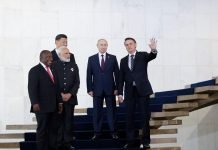By Karin Silvina Hiebaum

A few days before the runoff election in France, the opponents, head of state Emmanuel Macron and his challenger, Marine Le Pen, had a word duel on television. The debate focused on the key issues of the election campaign: proposals to strengthen purchasing power and Russia.
Macron accused Le Pen of depending on Russia. «They depend on Russian power and they depend on Mr. Putin,» Macron said. «They don’t talk to other leaders, they talk to their banker when they talk about Russia,» the liberal president continued. Macron was referring to a loan Le Pen took out from a Czech-Russian bank in 2014.

The politician defended herself by saying that French banks did not want to approve such financial aid to her. «Don’t you think that’s scandalous?» retorted Le Pen, speaking of a democratic deficit on the part of the banks. She also accused Macron of preventing her party from obtaining a loan in France in 2015 when she was a minister. The president replied that no one had intervened at the time. Moreover, he had been economy minister, and banks had not been part of his remit.
Le Pen wants to cancel arms cooperation with Berlin
The 53-year-old has condemned Russia’s invasion of Ukraine as a clear violation of international law. At the same time, she wants to advocate a rapprochement between NATO and Russia if the Ukraine war ends and a peace treaty is in place. The right-wing candidate, who accuses Macron of «blindness toward Berlin,» wants to cancel arms cooperation with Germany.
Macron emphasized France’s anchoring in the European Union and made a commitment to Franco-German cooperation. «I believe in Europe and I believe in the Franco-German pair. I think it’s the Franco-German pair that has allowed us to reach agreements.»
Exterior view of the Elysee Palace in Paris.
DEBATE
Where is France headed?
Le Pen said there is no European sovereignty because there is no European people. «I defend the Europe of nations.» She said she does not want to leave the EU; if she did, she would say so. Hers, she said, is about changes to the union.
Dispute over retirement age
Earlier, Macron and Le Pen presented contrasting proposals to boost purchasing power. At the start of the eagerly awaited only televised debate before Sunday’s runoff election, Macron held out the prospect of increases in pensions and the minimum wage, as well as sticking to caps on gas and electricity prices. He also said it was necessary to further reduce unemployment. Le Pen proposed lowering the value-added tax on energy and eliminating taxes on a hundred basic everyday products.
On the controversial issue of pensions, which is a recurring topic of debate in France, Le Pen insisted on retirement at the age of 60 to 62. He said that those who started working at the age of 16 to 20 should be able to retire at 60, while other employees should be able to retire at 62, as is currently the case. «Retiring at 65 is an absolute injustice,» Le Pen said of Macron’s plan for a higher retirement age.
Macron stressed that a pension from the age of 65 should not apply to all employees, with the exception of people in particularly strenuous occupations. In view of increased life expectancy, the pension system would have to be financed.
Striving for objectivity
There were disputes on the topics of environmental protection and energy supply. «Your program has neither hand nor foot,» Macron told Le Pen, whom he called a climate skeptic. Le Pen, in turn, accused the president of a «punitive ecology» that restricts the lives of «simple people.» While Macron advocated the parallel expansion of renewable energy and nuclear power, Le Pen called wind power «ecological and economic nonsense.»
Macron and Le Pen sought to have a factual, if critical, exchange at the start of the TV debate. When the two also sat opposite each other in a TV duel before the 2017 election, the discussion was marked by name-calling and personal attacks.
Now Macron showed himself to be a listener, agreeing with his opponent on some observations – but then going out of his way to refute her conclusions or claims. Le Pen also focused on her opponent’s statements and presented herself as an advocate for the people.
Wooing the favor of Melenchon voters
Both candidates are courting the voters of left-wing populist Jean-Luc Melenchon, who came in third in the first round with just under 22 percent. He is calling for «no vote for Le Pen» but refrains from supporting Macron. Melenchon is hoping for a good result for his La France Insoumise (Indomitable France) movement in the June parliamentary election and has already put himself in the running for prime minister.
For the last two days of the campaign, Le Pen plans several more visits to the north of the country, where she did well in the first round. Macron will conclude his campaign in Nice, in the south of France. In polls ahead of the runoff, the incumbent had recently been clearly ahead in voters’ favor. He averaged 55.83 percent. This means that the race is shaping up to be less close than polls had expected before the first round of the presidential election.
The political radio silence begins at midnight on Friday, during which neither the publication of polls nor interviews is permitted. Polling stations will be open from 8 a.m. to 7 p.m. Sunday, including until 8 p.m. in major cities. First projections will be published at 8 p.m.

Karin Silvina Hiebaum
E-Mail: Kshconsulta@gmail.com
Esta y otras noticias en nuestro canal de Telegram TFPOficial; siguenos tambien por Instagram thefreedompost_





